Items
Tag
Union Circus
-
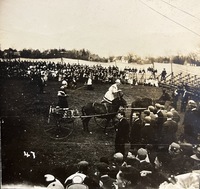 Chariot Race One of several activities in the Union Circus was a student-led chariot race. Two men, dressed in Roman costumes, race in chariots pulled by horses. A large crowed watches the performance from the sidelines of the Ferry Field ring.
Chariot Race One of several activities in the Union Circus was a student-led chariot race. Two men, dressed in Roman costumes, race in chariots pulled by horses. A large crowed watches the performance from the sidelines of the Ferry Field ring. -
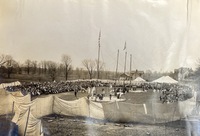 The Main Performance In this image, multiple students in the Union Circus perform for an audience. The circus ring, located in Ferry Field, is surrounded by bleachers full of people. Students dress in blackface, clown attire, and as various animals.
The Main Performance In this image, multiple students in the Union Circus perform for an audience. The circus ring, located in Ferry Field, is surrounded by bleachers full of people. Students dress in blackface, clown attire, and as various animals. -
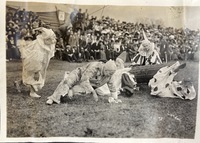 The "Log" Inscribed "721 Lyndon", this image shows five clowns participating in the Union Circus. Beneath the image is the phrase "The 'Log'". The circus ring, located in Ferry Field, is surrounded by bleachers full of people. They watch as the clowns tumble a long-like object.
The "Log" Inscribed "721 Lyndon", this image shows five clowns participating in the Union Circus. Beneath the image is the phrase "The 'Log'". The circus ring, located in Ferry Field, is surrounded by bleachers full of people. They watch as the clowns tumble a long-like object. -
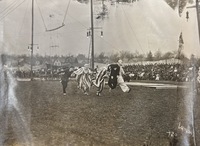 Clowns in Action Inscribed "720 Lyndon", this image shows four clowns participating in the Union Circus. The circus ring, located in Ferry Field, is surrounded by bleachers full of people. They watch as the clowns run across the arena.
Clowns in Action Inscribed "720 Lyndon", this image shows four clowns participating in the Union Circus. The circus ring, located in Ferry Field, is surrounded by bleachers full of people. They watch as the clowns run across the arena. -
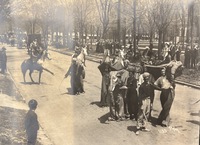 Elephants at "Parade Rest" Taken from the Kapp scrapbook, this image is inscribed with "Lyndon. 1133" and captioned with sentence "Elephants at 'Parade Rest'". It depicts the Union Circus parade, temporarily paused next to the university campus. White students clad in blackface perform various roles as either elephant trainer or indigenous person. Their costumes depict stereotypes of native peoples and of South Asians. Circus goers watch with interest from the sidelines. The Ann Arbor trolly tracks can be seen along the grass.
Elephants at "Parade Rest" Taken from the Kapp scrapbook, this image is inscribed with "Lyndon. 1133" and captioned with sentence "Elephants at 'Parade Rest'". It depicts the Union Circus parade, temporarily paused next to the university campus. White students clad in blackface perform various roles as either elephant trainer or indigenous person. Their costumes depict stereotypes of native peoples and of South Asians. Circus goers watch with interest from the sidelines. The Ann Arbor trolly tracks can be seen along the grass. -
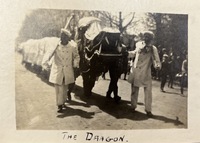 The Dragon The image is inscribed "THE DRAGON". As part of the Union Circus' parade, students constructed a long dragon costume to walk down State Street. The guides, both white men, wear a potentially Asian-inspired outfit and some form of blackface. Though unclear, it's probable these students are mimicking Asian men.
The Dragon The image is inscribed "THE DRAGON". As part of the Union Circus' parade, students constructed a long dragon costume to walk down State Street. The guides, both white men, wear a potentially Asian-inspired outfit and some form of blackface. Though unclear, it's probable these students are mimicking Asian men. -
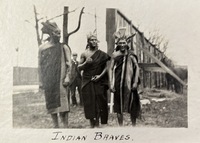 Indian Braves Three white men, costumed as stereotypical Native Americans, wear thin gowns and feathered headdresses. Additionally, the men are covered in brown makeup to mimic some Indigenous skin tones. The photograph is inscribed "INDIAN BRAVES". It's likely these men are part of the Union Circus' "Michigamua Indians" student group. Importantly, all members of this group were white men.
Indian Braves Three white men, costumed as stereotypical Native Americans, wear thin gowns and feathered headdresses. Additionally, the men are covered in brown makeup to mimic some Indigenous skin tones. The photograph is inscribed "INDIAN BRAVES". It's likely these men are part of the Union Circus' "Michigamua Indians" student group. Importantly, all members of this group were white men. -
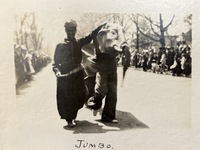 Jumbo the Elephant One of several blackface performances in the Union Circus, "Jumbo" the elephant and his guide drew much attention from the watching crowds. In place of real exotic animals, students dressed in animal costumes. The elephant, dubbed "Jumbo" by the inscription, required two students to act as legs. The white man guiding Jumbo wears a turban and blackface. The phrase "All Together Julia-" is inscribed under the second image in the Low scrapbook.
Jumbo the Elephant One of several blackface performances in the Union Circus, "Jumbo" the elephant and his guide drew much attention from the watching crowds. In place of real exotic animals, students dressed in animal costumes. The elephant, dubbed "Jumbo" by the inscription, required two students to act as legs. The white man guiding Jumbo wears a turban and blackface. The phrase "All Together Julia-" is inscribed under the second image in the Low scrapbook. -
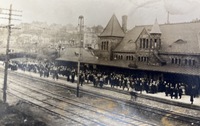 The Circus Comes to Town Days before the Union Circus' opening event, a delivery of circus material by train was anticipated. Captured by image in the Low scrapbook, crowds wait to collect the equipment at the old Michigan Central Depot before it was decommissioned.
The Circus Comes to Town Days before the Union Circus' opening event, a delivery of circus material by train was anticipated. Captured by image in the Low scrapbook, crowds wait to collect the equipment at the old Michigan Central Depot before it was decommissioned. -
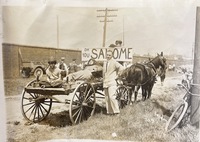 Oh You Salome Found within the Frank Kapp scrapbook, this image displays two children and two men, one wearing a woman's dress, resting on a Union Circus wagon. A sign reading "Oh You Salome" sits in the center of the group, identifying the men as part of the titular side show performance. Beneath the image is the inscription "Oh you kid!!!". The performance may be anti-Semitic in nature. The Biblical Salome was a Jewish princess often blamed for the murder of John the Baptist. Several plays and operatic productions about Salome were popular prior to 1909.
Oh You Salome Found within the Frank Kapp scrapbook, this image displays two children and two men, one wearing a woman's dress, resting on a Union Circus wagon. A sign reading "Oh You Salome" sits in the center of the group, identifying the men as part of the titular side show performance. Beneath the image is the inscription "Oh you kid!!!". The performance may be anti-Semitic in nature. The Biblical Salome was a Jewish princess often blamed for the murder of John the Baptist. Several plays and operatic productions about Salome were popular prior to 1909. -
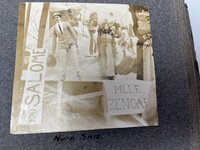 Nuff Said Despite the inscription "NUFF SAID," there is sizable uncertainty surrounding the activity captured on the image. Two men, one wearing a woman's dress, stand on a stage before a painting of stereotypical Middle Eastern peoples. A sign reading "Oh You Salome" rests near the side show stage. The combination of these elements suggests the performance may be anti-Semitic in nature. The Biblical Salome was a Jewish princess often blamed for the murder of John the Baptist. Several plays and operatic productions about Salome were popular prior to 1909.
Nuff Said Despite the inscription "NUFF SAID," there is sizable uncertainty surrounding the activity captured on the image. Two men, one wearing a woman's dress, stand on a stage before a painting of stereotypical Middle Eastern peoples. A sign reading "Oh You Salome" rests near the side show stage. The combination of these elements suggests the performance may be anti-Semitic in nature. The Biblical Salome was a Jewish princess often blamed for the murder of John the Baptist. Several plays and operatic productions about Salome were popular prior to 1909. -
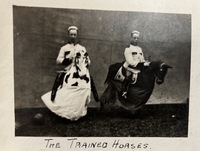 The Trained Horses "THE TRAINED HORSES", as the inscription reads, are two students dressed as both horse and rider. This performers were two of many people costumed as animals in the Union Circus.
The Trained Horses "THE TRAINED HORSES", as the inscription reads, are two students dressed as both horse and rider. This performers were two of many people costumed as animals in the Union Circus. -
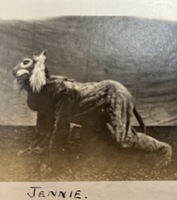 The Union Circus "Tiger" The inscription accompanying this image reads "JENNIE". The name may refer to either the student dressed as a tiger or the tiger character itself. This performer was one of many costumed as an animal in the Union Circus.
The Union Circus "Tiger" The inscription accompanying this image reads "JENNIE". The name may refer to either the student dressed as a tiger or the tiger character itself. This performer was one of many costumed as an animal in the Union Circus. -
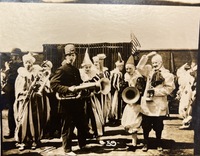 A Bunch of Clowns The popularity of brass bands at the beginning of the 20th century is made evident by this image of musical performers in the Union Circus. The band, clad in clown costumes and police uniforms, holds a variety of instruments, including: trumpets, trombones, and tubas. The group of more than 12 men appears to be waiting for their performance to begin. The inscription below the photograph reads "A Bunch of Clowns"
A Bunch of Clowns The popularity of brass bands at the beginning of the 20th century is made evident by this image of musical performers in the Union Circus. The band, clad in clown costumes and police uniforms, holds a variety of instruments, including: trumpets, trombones, and tubas. The group of more than 12 men appears to be waiting for their performance to begin. The inscription below the photograph reads "A Bunch of Clowns" -
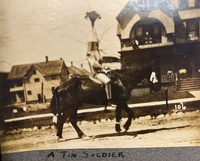 A Tin Soldier A student in the Union Circus dubbed "A Tin Soldier" by the inscription under the image, trots through Ann Arbor on his dark horse. He is costumed from head to toe in metal material to appear as a knight. A large plum sticks up from the top of his helmet. Based on the circus' known parade route, the location the image was taken is likely along State Street.
A Tin Soldier A student in the Union Circus dubbed "A Tin Soldier" by the inscription under the image, trots through Ann Arbor on his dark horse. He is costumed from head to toe in metal material to appear as a knight. A large plum sticks up from the top of his helmet. Based on the circus' known parade route, the location the image was taken is likely along State Street. -
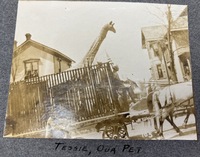 Tessie, Our Pet In lieu of real exotic animals, students crafted replicas for actors to wear during the parade. A giraffe, named "Tessie" according to the image's description, was a highlight of the event. One image shows the costumed students being driven downtown in a caged wagon, while the other shows the students stationed somewhere, possibly Ferry Field, with another student.
Tessie, Our Pet In lieu of real exotic animals, students crafted replicas for actors to wear during the parade. A giraffe, named "Tessie" according to the image's description, was a highlight of the event. One image shows the costumed students being driven downtown in a caged wagon, while the other shows the students stationed somewhere, possibly Ferry Field, with another student. -
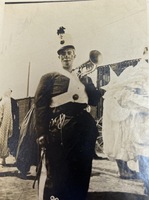 The Trumpeter Clown Found in the Low scrapbook, this image depicts a member of the Union Circus dressed in clown clothing and face-paint. He stands near other costumed individuals and a caged wagon. Based on the clown's trump, he was likely in the brass band that moved down State Street.
The Trumpeter Clown Found in the Low scrapbook, this image depicts a member of the Union Circus dressed in clown clothing and face-paint. He stands near other costumed individuals and a caged wagon. Based on the clown's trump, he was likely in the brass band that moved down State Street. -
 Circus Guide Book Found within the Stowell Stebbins scrapbook, this Circus Guide Book is inscribed with the name "Miss Catherine Clarke". To illustrate the upcoming events, a red clothed clown appears to burst through the guide's cover. An artistic signature (Yanning?) is printed in the illustration's corner. The contents of the book exhibit advertisements for local businesses, the "Minstrel and Vaudeville Show," and the Chicago tent company hired by the circus. Amongst the advertisements are descriptions of circus features, including clowns. An illustration of a clown in blackface accompanies the description.
Circus Guide Book Found within the Stowell Stebbins scrapbook, this Circus Guide Book is inscribed with the name "Miss Catherine Clarke". To illustrate the upcoming events, a red clothed clown appears to burst through the guide's cover. An artistic signature (Yanning?) is printed in the illustration's corner. The contents of the book exhibit advertisements for local businesses, the "Minstrel and Vaudeville Show," and the Chicago tent company hired by the circus. Amongst the advertisements are descriptions of circus features, including clowns. An illustration of a clown in blackface accompanies the description. -
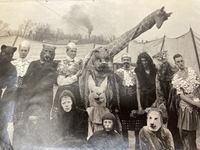 Men in Costume Pose for Photo Students participating in the Union Circus dress in various costumes for a photograph. This photo was found in the scrapbook of former University of Michigan student, Stowell Stebbins. Some are knights and cavemen, while the most notable are animals (bear, rabbit, giraffe, monkey, and large cats). The image was inscribed "The Wild Beasts" which a caption below reading "GR-R-R-R-R-OWL", perhaps in reference to the large animals often found in other circuses of the day. No exotic animals made an actual appearance at the Union Circus, so students themselves filled that particular role. They pose for a group photo outside of the Ferry Field tents.
Men in Costume Pose for Photo Students participating in the Union Circus dress in various costumes for a photograph. This photo was found in the scrapbook of former University of Michigan student, Stowell Stebbins. Some are knights and cavemen, while the most notable are animals (bear, rabbit, giraffe, monkey, and large cats). The image was inscribed "The Wild Beasts" which a caption below reading "GR-R-R-R-R-OWL", perhaps in reference to the large animals often found in other circuses of the day. No exotic animals made an actual appearance at the Union Circus, so students themselves filled that particular role. They pose for a group photo outside of the Ferry Field tents. -
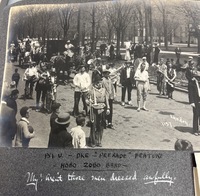 My! Aren't those men dressed awfully? This photo was found in the scrapbook of former University of Michigan student, Stowell Stebbins. The image was inscribed "PSI U. - DKE - "Peerade" Feature - Hobo Zobo Band" and "My! Aren't those men dressed awfully." Young boys watch from the sideline as men dressed as "hobos" walk down the unpaved street with marching band instruments. Some of these white men showcase fake stubble, while others appear to be painted in blackface. Horses, carriages, clowns, and knights are also part of the procession.
My! Aren't those men dressed awfully? This photo was found in the scrapbook of former University of Michigan student, Stowell Stebbins. The image was inscribed "PSI U. - DKE - "Peerade" Feature - Hobo Zobo Band" and "My! Aren't those men dressed awfully." Young boys watch from the sideline as men dressed as "hobos" walk down the unpaved street with marching band instruments. Some of these white men showcase fake stubble, while others appear to be painted in blackface. Horses, carriages, clowns, and knights are also part of the procession. -
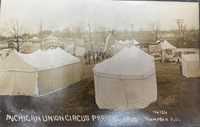 Union Circus Tents and Activities Ferry Field near State Street was transformed into the main center of Union Circus activities. Several large tents stand around the field, one housing what appears to be a large arena. Crowds of people wrap around the interior of the arena, while others watch as people attempt a towering slide. A small sign reading "5¢ Tickets" sits near the base of the slide.
Union Circus Tents and Activities Ferry Field near State Street was transformed into the main center of Union Circus activities. Several large tents stand around the field, one housing what appears to be a large arena. Crowds of people wrap around the interior of the arena, while others watch as people attempt a towering slide. A small sign reading "5¢ Tickets" sits near the base of the slide. -
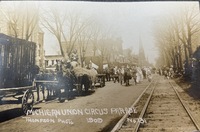 Michigan Union Circus Parade A photograph inscribed "Michigan Union Circus Parade , Thompson Photo, 1909, No.131". Clowns, knights, horses, wagons, and a cage move down State Street. Families sit amongst the trees along one side of the old Ann Arbor trolly track. Toward the back of the image, children appear to be in conversation with members of a band.
Michigan Union Circus Parade A photograph inscribed "Michigan Union Circus Parade , Thompson Photo, 1909, No.131". Clowns, knights, horses, wagons, and a cage move down State Street. Families sit amongst the trees along one side of the old Ann Arbor trolly track. Toward the back of the image, children appear to be in conversation with members of a band. -
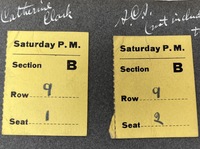 Two Tickets for Section B Two yellow tickets to the Union Circus, presumably for a show in the Big Top. Both tickets are labeled for Section B, Row 9. These particular items were adhered to a scrapbook belonging to former University of Michigan student, Stowell Stebbins . Written around the tickets are the names "Catherine Clark" and "S.C.S. (not including the [illegible])".
Two Tickets for Section B Two yellow tickets to the Union Circus, presumably for a show in the Big Top. Both tickets are labeled for Section B, Row 9. These particular items were adhered to a scrapbook belonging to former University of Michigan student, Stowell Stebbins . Written around the tickets are the names "Catherine Clark" and "S.C.S. (not including the [illegible])". -
 President James B. Angell purchases ticket The president of the University of Michigan, James B. Angell, purchasing a ticket to the students' Union Circus from Horace P. Dix.
President James B. Angell purchases ticket The president of the University of Michigan, James B. Angell, purchasing a ticket to the students' Union Circus from Horace P. Dix. -
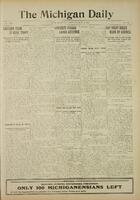 Union Circus Did Not Pay Despite its fundraising goal, the Union Circus failed to bring in the desired profit. "Adverse Weather Conditions" prevented afternoon performances, resulting in monetary loss. A partnering vaudeville show proved more successful and managed to cover the expenses.
Union Circus Did Not Pay Despite its fundraising goal, the Union Circus failed to bring in the desired profit. "Adverse Weather Conditions" prevented afternoon performances, resulting in monetary loss. A partnering vaudeville show proved more successful and managed to cover the expenses.